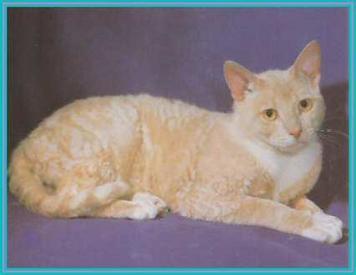
The result of a random genetic mutation, the Oregon Rex developed in America in the 20th century and rose to considerable popularity for a short period. Despite sharing the variation for curly coat with other Rex breeds, the Oregon Rex is genetically different, being the result of a recessive gene mutation as opposed to a dominant one. Because of crossbreeding with the Cornish Rex, which arrived in the United States during the Oregon’s development, the breed was not destined to exist independently for long. Believed to have disappeared in 1972, the Oregon Rex is one of the only cat breeds to have gone extinct.
This lost breed was similar in appearance to its Devon and Cornish cousins, though perhaps being smaller. Possessing a lithe and athletic body that is accentuated by the Rex’s lack of hair, the breed has long legs, a small, round head, large ears and a narrow tail. Besides this, the Cornish Rex is characterised by high cheekbones, a defined chin and a thin-looking coat. The Oregon Rex is without guard hairs, the outermost fur, making the cat look naked albeit for a fine, sometimes curly, down of hair. All colours are permissible in the breed.
Because the cat no longer exists, describing any modern-day behavioural traits is difficult. It is generally thought that the Oregon Rex shared the same traits and temperament as the Devon and Cornish Rex breeds, and displayed an attitude of affection, sociability and playfulness. Like the Devon and Cornish Rex, the Oregon Rex was very demanding of attention and did not suit being left alone for long periods of time. Past owners and enthusiasts described the breed as headstrong, stubborn and not a good breed choice for the first-time owner. On average, a healthy Oregon Rex would have weighed up to 10 pounds, with a typical life expectancy of 12-15 years.
No genetic or breed-specific health conditions are documented in the Oregon Rex because of its rarity even before it came extinct.
Do you own a Oregon Rex? Let others know what they're like!
Related products
Advantage 80 Spot On Flea Control Large Cats and Rabbits
from £12.95
Advantage 40 Spot On Flea Control Cats, Small Dogs and Rabbits
from £12.95
Advantage 250 Spot On Flea Control Large Dog
from £12.95
Advantage 100 Spot On Flea Control Medium Dog
from £12.95
Drontal Tasty Bone Wormer Tablets for Small & Medium Dogs (2 to 20kg)
from £2.15
TermaWorm™ Tablets for Cats & Dogs
from £1.79
Drontal Tasty Bone XL Wormer Tablets for Large Dogs (Over 20kg)
from £6.39
Advantage 400 Spot On Flea Control Extra Large Dog
from £12.95